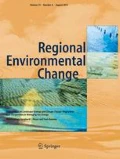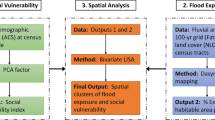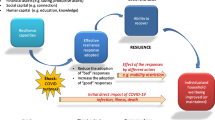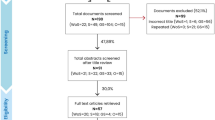Abstract
Vulnerabilities to floods in Thailand are changing as a result of many factors. Formal and informal institutions help shape exposure, sensitivity and capacities to respond of individuals, social groups and social-ecological systems. In this paper we draw on several case studies of flood events and flood-affected communities to first assess how current practices reflect various laws, procedures, programs and policies for managing floods and disasters and then explore the implications for dealing with additional challenges posed by climate change. Our analysis identifies several institutional traps which need to be overcome if vulnerability is to be reduced, namely capture of agendas by technical elites, single-level or centralized concentration of capacities, organizational fragmentation and overemphasis on reactive crisis management. Possible responses are to expand public participation in managing risks, build adaptive capacities at multiple levels and link them, integrate flood disaster management and climate change adaptation into development planning, prioritize risk reduction for socially vulnerable groups and strengthen links between knowledge and practice. Responses like these could help reduce vulnerabilities under current climate and flood regimes, while also improving capacities to handle the future which every way that unfolds.

Similar content being viewed by others
References
Adger NW (2000) Institutional adaptation to environmental risk under the transition in Vietnam. Ann Assoc Am Geogr 90:738–758
Adger NW (2001) Scales of governance and environmental justice for adaptation and mitigation of climate change. J Int Dev 13:921–931
Adger NW (2006) Vulnerability. Glob Environ Change 16:268–281
ADPC (2000) Community based disaster management. Trainer’s guide. Asian Disaster Preparedness Centre, Bangkok
Aeerts J, Droogers P (2009) Adapting to climate change in the water sector. In: Ludwig F, Kabat P, van Schaik H, van der Valk M (eds) Climate change adaptation in the water sector. Earthscan, London, pp 87–107
Assanangkornchai S, Tangboonngam S, Edwards JG (2004) The flooding of Hat Yai: predictors of adverse emotional responses to a natural disaster. Stress Health 20:81–90
Atsamon L, Sangchan L, Thavivongse S (2009) Assessment of extreme weather events along the coastal areas of Thailand. In: 89th American Meteorological Society Annual Meeting
Bangkok Post (2008a) A disaster in the Making. Editorial. Bangkok Post, 17 May 2008, Bangkok
Bangkok Post (2008b) Gulf communities ‘face devastation’. Bangkok Post, 15 August 2008, Bangkok
Bangkok Post (2008c) Storm surge fears. Is the threat real? Bangkok Post, 5 October 2008, Bangkok
Berkes F (2007) Understanding uncertainty and reducing vulnerability: lessons from resilience thinking. Nat Hazards 41:283–295
BMA, GLF, UNEP (2009) Bangkok assessment report on climate change 2009. Bangkok Metropolitan Administration, Green Leaf Foundation, United Nations Environment Programme, Bangkok
Burton I, van Aalst MK (1999) Come hell or high water: Integrating climate change vulnerability and adaptation into Bank work. World Bank Environment Department Papers, 72. The World Bank, Washington, DC
Carpenter SR, Brock WA (2008) Adaptive capacity and traps. Ecol Soc 13:40. [online] URL: http://www.ecologyandsociety.org/vol13/iss2/art40/
Chinvanno S, Souvannalath S, Lersupavithnapa B, Kerdsuk V, Thuan NTH (2008a) Climate risks and rice farming in the lower Mekong River countries. In: Leary N, Adejuwon J, Barros V, Burton I, Kulkarni J, Lasco R (eds) Climate change and vulnerability. Earthscan, London, pp 333–350
Chinvanno S, Souvannalath S, Lersupavithnapa B, Kerdsuk V, Thuan NTH (2008b) Strategies for managing climate risks in the Lower Mekong River Basin: a place-based approach. In: Leary N, Adejuwon J, Barros V, Burton I, Kulkarni J, Lasco R (eds) Climate change and adaptation. Earthscan, London, pp 228–246
Chuenniran A (2008) Thais warned of storms in Nargis’ wake: cyclone weakens but parts of country at risk. Bangkok Post, 8 May 08, Bangkok
DDPM (2006) Thailand country report. Department of Disaster Prevention and Mitigation, Ministry of Interior, Thailand
Eastham J, Mpelaskoka F, Mainuddin M, Ticehurst C, Dyce P, Hodgson G, Ali R, Kirby M (2008) Mekong river basin water resources assessment: impacts of climate change. CSIRO: water for a healthy country National Research Flagship
Elster J (1992) Local justice: how institutions allocate scarce goods and necessary burdens. Russell Sage Foundation, New York
Few R (2003) Flooding, vulnerability and coping strategies: local responses to a global threat. Prog Dev Stud 3:43–58
Folke C, Hahn T, Olsson P, Norberg J (2005) Adaptive governance of social-ecological systems. Annu Rev Environ Resour 30:441–473
Friend R (2007) Securing sustainable livelihoods through wise use of wetland resources: reflections on the experience of the Mekong Wetlands Biodiversity Conservation and Sustainable Use Programme (MWBP). Mekong Wetlands Biodiversity Conservation and Sustainable Use Programme, Vientianne, Lao PDR
Fussel H-M (2007) Vulnerability: a generally applicable conceptual framework for climate change research. Glob Environ Change 17:155–167
Gallopin G (2006) Linkages between vulnerability, resilience and adaptive capacity. Glob Environ Change 16:293–303
Garden P (2007) The Chiang Mai floods of 2005. USER Working Paper WP-2007-19. Unit for Social and Environmental Research, Chiang Mai University, Chiang Mai
Government of Thailand (2007) Royal Gazette, vol 124 Part 52 A, 7 September 2007 (B.E. 2550). Government of Thailand
Hallegatte S (2009) Strategies to adapt to an uncertain climate change. Glob Environ Change 19:240–247
Hongthong P (2006) Farmers upset over huge floodwater diversions. The Nation: Bangkok, 6 December 2006
IPCC (2007) Climate change 2007: the physical science basis. Contribution of Working Group I to the Fourth Assessment Report of the IPCC. Cambridge University Press, Cambridge
Kamolvej T (2006) The integration of intergovernmental coordination and information management in response to immediate crises: Thailand emergency management. Graduate School of Public and International Affairs, University of Pittsburgh, Pittsburg
Koch IC, Vogel C, Patel Z (2007) Institutional dynamics and climate change adaptation in South Africa. Mitig Adapt Strat Glob Change 12:1323–1339
Lakanavichian S (2001) Forest policy and history in Thailand. Research Centre on Forest and People in Thailand, University of Aarhus, Denmark
Lebel L (2007) Adapting to climate change. Global Asia 2:15–21
Lebel L, Sinh BT (2007) Politics of floods and disasters. In: Lebel L, Dore J, Daniel R, Koma YS (eds) Democratizing water governance in the Mekong region. Mekong Press, Chiang Mai, pp 37–54
Lebel L, Sinh B (2009) Risk reduction or redistribution? Flood management in the Mekong region. Asian J Environ Disaster Manage 1:23–39
Lebel L, Anderies JM, Campbell B, Folke C, Hatfield-Dodds S, Hughes T, Wilson J (2006a) Governance and the capacity to manage resilience in regional social-ecological systems. Ecol Soc 11(1):11:19. [online] URL: http://www.ecologyandsociety.org/vol11/iss1/art19/
Lebel L, Nikitina E, Kotov V, Manuta J (2006b) Assessing institutionalized capacities and practices to reduce the risks of flood disasters. In: Birkmann J (ed) Measuring vulnerability to natural hazards: towards disaster resilient societies. United Nations University Press, Tokyo, pp 359–379
Lebel P, Chaibu P, Lebel L (2006c) Fish farm management practices in the upper Ping River, northern Thailand. USER Working Paper WP-2006-07. Unit for Social and Environmental Research, Chiang Mai University Chiang Mai
Lebel L, Nikitina E, Sinh BT (2008) Climate change and the science and practice of managing floods in urbanizing regions of Monsoon Asia. MAIRS Working Paper Series #4. Monsoon Asia Integrated Regional Study International Project Office and the Institute for Atmospheric Physics, Chinese Academy of Science, Beijing
Lebel L, Foran T, Garden P, Manuta BJ (2009a) Adaptation to climate change and social justice: challenges for flood and disaster management in Thailand. In: Ludwig F, Kabat P, van Schaik H, van der Valk M (eds) Climate change adaptation in the water sector. Earthscan, London, pp 125–141
Lebel L, Garden P, Subsin N, Nan SN (2009b) Averted crises, contested transitions: water management in the Upper Ping River basin, northern Thailand. In: Huitema D, Meijerink S (eds) Water policy entrepreneurs. A research companion to water transitions around the globe. Edward Elgar, Cheltenham, pp 137–157
Lebel L, Sinh BT, Garden P, Seng S, Tuan LA, Truc DV (2009c) The promise of flood protection: dykes and dams, drains and diversions. In: Molle F, Foran T, Kakonen J (eds) Contested waterscapes in the Mekong region. Earthscan, London, pp 283–306
Limjirakan S, Limsakul A, Sriburi T (2009) Increasing trend of extreme rain events over Bangkok metropolitan area. In: 89th American Meteorological Society Annual Meeting
Maiklad P (1999) Development and achievements in flood control and management in Thailand. In: UN-ESCAP (ed) Regional cooperation in the 21st century in flood control and management in Asia and the Pacific. United Nations, New York, pp 59–111
Manuta J, Khrutmuang S, Huaisai D, Lebel L (2006) Institutionalized incapacities and practice in flood disaster management in Thailand. Sci Cult 72:10–22
Molle F (2008) Nirvana concepts, narratives and policy models: insights from the water sector. Water Alternat 1:23–40
Mollinga P, Meinzen-Dick R, Merrey D (2007) Politics, plurality and problemsheds: a strategic approach for reform of agricultural water resources management. Dev Policy Rev 25:699–719
MRC (2009) Climate change adaptation in the Lower Mekong Basin countries. Regional synthesis report. Climate change and adaptation initiative. Mekong River Commission, Vientiane
Naess LO, Bang O, Eriksen S, Vevatne J (2005) Institutional adaptation to climate change: flood responses at the municipal level in Norway. Glob Environ Change 15:125–138
NESDB, UNEP, TEI (2008) National sustainable development strategy for Thailand: a guidance manual. Office of National Economic and Social Development Board, United Nations Environment Programme, Thailand Environment Institute, Bangkok
Nikitina E (2006) Success and failures in flood risk reduction programs across Asia: some lessons learned. Sci Cult 72:72–83
OEPP (2000) Thailand’s initial National communication under the United Nations framework convention on climate change. Office of Environmental Policy and Planning, Ministry of Science, Technology and Environment, Bangkok
ONEP (2007) Five-year strategy on climate change (2008-12). Office of Natural Resources and Environmental Policy and Planning, Ministry of Natural Resources and the Environment
Ostrom E (2005) Understanding institutional diversity. Princeton University Press, New Jersey
Paavola J, Adger NW (2006) Fair adaptation to climate change. Ecol Econ 56:594–609
Pahl-Wostl C (2007) Transitions towards adaptive management of water facing climate and global change. Water Resour Manage 21:49–62
Pahl-Wostl C (2009) A conceptual framework for analyzing adaptive capacity and multi-level learning processes in resource governance regimes. Glob Environ Change 19:345–365
Phien-Wej N, Nutalaya P, Aung Z, Zhibin T (1993) Catastrophic landslides and debris flows in Thailand. Bull Eng Geol Environ 48:93–100
Polterovich V (2001) Institutional traps. In: Klein L, Porner M (eds) The new Russia: transition gone awry. Stanford University Press, Stanford, pp 93–116
Sharma D, Gupta AD, Babel MS (2007) Spatial disaggregation of bias-corrected GCM precipitation for improved hydrologic simulation: Ping River Basin, Thailand. Hydrol Earth Syst Sci Discuss 4:35–74
Singhrattna N, Rajagopalan B, Kumar KK, Clark M (2005) Interannual and interdecadal variability of Thailand summer monsoon season. J Clim 18:1697–1708
Siribakdi K (2008) Water worries. Bangkok Post, Bangkok, 10 April 2008
Smit B, Wandel J (2006) Adaptation, adaptive capacity, and vulnerability. Glob Environ Change 16:282–292
Sukpanich T (2008) Storm warning. Bangkok Post, Bangkok, 11 May 08
Takeuchi K (2001) Increasing vulnerability to extreme floods and societal needs of hydrological forecasting. J Hydrol Sci 46:869–881
Tanavud C, Yongchalermchai C, Bennui A, Densreeserekul O (2004) Assessment of flood risk in Hat Yai municipality, Southern Thailand, using GIS. J Nat Disaster Sci 26:1–14
Tangwisutijit N (2007) Bangkok will be underwater, experts predict. The Nation, Bangkok, 26 June 2007
Tangwisutijit N (2008) Millions of Bangkokians at risk. The Nation. 2 January 2008. Bangkok
The Nation (2006) Large areas ‘needed for overflows’. The Nation, Bangkok, 12 October 2006
The Nation (2007) Call to learn lessons and brace for disasters. The Nation, Bangkok, 22 December 2007
Thomas DSG, Twyman C (2005) Equity and justice in climate change adaptation amongst natural-resource-dependent societies. Glob Environ Change 15:115–124
van Beek E (2009) Managing water under current climate variability. In: Ludwig F, Kabat P, van Schaik H, van der Valk M (eds) Climate change adaptation in the water sector. Earthscan, London, pp 51–77
Walker B, Carpenter SR, Anderies J, Abel N, Cumming GS, Janssen MA, Lebel L, Norberg J, Peterson GD, Pritchard L (2002) Resilience management in social-ecological systems: a working hypothesis for a participatory approach. Conserv Ecol 6:14. [Online] URL: http://www.ecologyandsociety.org/vol6/iss1/art14
Wickramanayake E, Shook GA, Rojnkureesatien T (1995) Rehabilitation planning for flood affected areas of Thailand: experience from Phipun District. Disasters 19:348–355
Wipatayotin A (2007) Group floats plan to keep rising sea out. Bangkok Post, Bangkok, Thailand
Young OR (2002) The institutional dimensions of environmental change: fit, interplay and scale. MIT Press, Cambridge
Yuthavong Y (2007) Thai strategies to fight climate change. The Nation, Bangkok, 26 December 2007
Acknowledgments
The Packard Foundation through the START International Secretariat is thanked for their support to Jesse Manuta. The Asia–Pacific Network for Global Environmental Change Research, START and the Challenge Program for Water and Food (PN50 funded by Echel Eau and International Fund for Agriculture Development) provided support to Po Garden and Louis Lebel. The paper was finalized with support from the Twin2Go Project funded by the European Commission FP7. The paper is a contribution to the IHDP Earth System Governance Project and Mekong Program on Water, Environment and Resilience. We thank Rajesh Daniel, Lilibeth Acosta-Michlik, and two anonymous reviewers for constructive feedback on earlier drafts of this manuscript.
Author information
Authors and Affiliations
Corresponding author
Rights and permissions
About this article
Cite this article
Lebel, L., Manuta, J.B. & Garden, P. Institutional traps and vulnerability to changes in climate and flood regimes in Thailand. Reg Environ Change 11, 45–58 (2011). https://doi.org/10.1007/s10113-010-0118-4
Received:
Accepted:
Published:
Issue Date:
DOI: https://doi.org/10.1007/s10113-010-0118-4




